Tyne Cot Memorial
Roll of Honour
I J K
Dedications
S/16922 Lance Corporal William Innes, 5th Bn. Queen's Own Cameron Highlanders, 25/04/1918, aged 19. "Never forgotten"
Remembered with honour by great nephew, John Green.
S/16922 Lance Corporal William Innes, 5th Bn. Queen's Own Cameron Highlanders, 25/04/1918, aged 19. "Never forgotten"
Remembered with honour by great nephew, John Green.
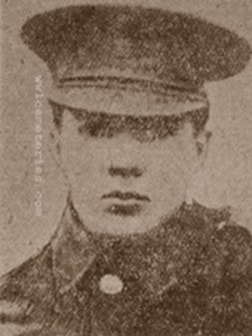
15469 Private
Frank Isherwood
1st Bn. Lancashire Fusiliers
9th October 1917, aged 22.
Panel 54 to 60 and 163A.
Son of Mrs. M. A. Isherwood, of 9, Pollard St., Burnley, Lancashire.
Frank Isherwood
1st Bn. Lancashire Fusiliers
9th October 1917, aged 22.
Panel 54 to 60 and 163A.
Son of Mrs. M. A. Isherwood, of 9, Pollard St., Burnley, Lancashire.
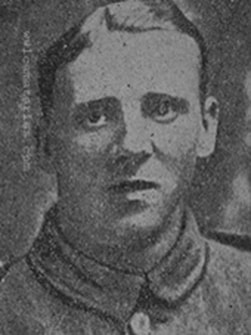
13174 Private
Admiral (Albert) Jackson
7th Bn. East Lancashire Regiment
17th September 1917.
Panel 77 to 79 and 163A.
Lived at 23 Sackville Street, Burnley, Lancashire.
Admiral (Albert) Jackson
7th Bn. East Lancashire Regiment
17th September 1917.
Panel 77 to 79 and 163A.
Lived at 23 Sackville Street, Burnley, Lancashire.
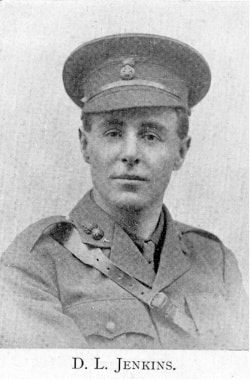
Lieutenant
David Lewis Jenkins
5th Bn. Attached to 10th Bn. Royal Welsh Fusiliers
26th September 1917, aged 31.
Panel 63 to 65.
Son of Anne Jenkins, of Enkrateia, Llanon, Aberystwyth, Cardiganshire, and the late Capt. David Jenkins (Master Mariner).
The information below supplied by 'The Ellesmerian Club', the alumni organisation for Ellesmere College where David was a pupil.
David Lewis Jenkins
5th Bn. Attached to 10th Bn. Royal Welsh Fusiliers
26th September 1917, aged 31.
Panel 63 to 65.
Son of Anne Jenkins, of Enkrateia, Llanon, Aberystwyth, Cardiganshire, and the late Capt. David Jenkins (Master Mariner).
The information below supplied by 'The Ellesmerian Club', the alumni organisation for Ellesmere College where David was a pupil.
David Lewis Jenkins, the son of Captain David and Anne Jenkins of Enkrania House, Llanon, Aberystwyth, was born on 2nd June 1886. He entered the ‘Arthur’ dormitory at Ellesmere College, north Shropshire in May 1900, one of twenty-nine new boys admitted that term, and stayed for two years until he left in July 1902. There were one hundred and ninety pupils in the college.
During those two years he played a very full and active part in college life, on and off the sports field.
He passed his Oxford Local Examinations in Arithmetic, Dictation, English Grammar, History, Shakespearian Essay, Welsh and Mathematics. He also gained his Pitman Shorthand Certificate - and excelled in this to the extent he was awarded the prize for it at Speech Day 1902.
He played cricket for his dormitory, took part in the swimming sports in the summer of 1902 and was a very keen rugby player who represented the college on many occasions. His reputation as a player saw him go on to play for Crickhowell and Brynmawr in the 1903 season. His enthusiasm for sport of all types was demonstrated when he was selected to sit on the Games Committee.
There is very little evidence of his chosen career path immediately he left Ellesmere. It is presumed that he entered the world of banking and worked his way up through the profession as he was the manager of the National Provincial Bank, Abergele when he enlisted in the Liverpool Pals in September 1914.
It would appear he enjoyed his experiences with the college Officer Training Corps which was attached to the 5th (Volunteer) Battalion, the King’s Shropshire Light Infantry as, after leaving Ellesmere he enlisted with the Territorial Force and was with the 4th (Volunteer) Battalion, the South Wales Borderers and the 3rd (Volunteer) Battalion, the Monmouth Regiment.
He had been serving as a Corporal in the 5th (Voluntary) Battalion (Territorial Force), the Royal Welsh Fusiliers prior to the outbreak of war and so was commissioned almost immediately as a 2nd Lieutenant.
On 16th September 1914, he joined the Royal Welsh Fusiliers. He saw action in Gallipoli and was present at the landings at Suvla Bay. He was wounded in this campaign and invalided back to England.
On his recovery he transferred to the Royal Flying Corps and he was based at the No. 2 School of Aeronautics from 7th November 1916. However, for reasons unknown, he was to re-join the 10th Battalion, the Royal Welsh Fusiliers on 7th April 1917.
He embarked with them on 14th May 1917 and fought at the First and Second Battles of the Scarpe, at the Battle of Arleux and the Third Battle of the Scarpe, where the battalion captured Rouex. Again, the men pressed on, this time back to Ypres, where they fought in the Third Battle of Ypres, at the Battle of the Menin Road and the Battle of Polygon Wood.
His promotion to Lieutenant was confirmed in July.
On 26th September 1917 he was at the attack on Zonnedecke Church where he was in charge of the first company in his battalion to reach their objective. Before going into action he had, according to his superior officer, said to his men “Now Boys! ‘Hen Wlad Fy Nhadau ’(Land of my Fathers). He died in the action.
Captain Richards, a fellow Officer, wrote: “I still feel dazed and hardly realise that he has gone. He was absolutely lionhearted. On one occasion at least that I know of he deserved some very high recognition of his work.”
His life is commemorated on War Memorials at Tyne Cot, Belgium; Llansantffraid, near Llanon; Ellesmere College and on the Memorial to the 5th Battalion, the Welsh Regiment, Pontypridd.
During those two years he played a very full and active part in college life, on and off the sports field.
He passed his Oxford Local Examinations in Arithmetic, Dictation, English Grammar, History, Shakespearian Essay, Welsh and Mathematics. He also gained his Pitman Shorthand Certificate - and excelled in this to the extent he was awarded the prize for it at Speech Day 1902.
He played cricket for his dormitory, took part in the swimming sports in the summer of 1902 and was a very keen rugby player who represented the college on many occasions. His reputation as a player saw him go on to play for Crickhowell and Brynmawr in the 1903 season. His enthusiasm for sport of all types was demonstrated when he was selected to sit on the Games Committee.
There is very little evidence of his chosen career path immediately he left Ellesmere. It is presumed that he entered the world of banking and worked his way up through the profession as he was the manager of the National Provincial Bank, Abergele when he enlisted in the Liverpool Pals in September 1914.
It would appear he enjoyed his experiences with the college Officer Training Corps which was attached to the 5th (Volunteer) Battalion, the King’s Shropshire Light Infantry as, after leaving Ellesmere he enlisted with the Territorial Force and was with the 4th (Volunteer) Battalion, the South Wales Borderers and the 3rd (Volunteer) Battalion, the Monmouth Regiment.
He had been serving as a Corporal in the 5th (Voluntary) Battalion (Territorial Force), the Royal Welsh Fusiliers prior to the outbreak of war and so was commissioned almost immediately as a 2nd Lieutenant.
On 16th September 1914, he joined the Royal Welsh Fusiliers. He saw action in Gallipoli and was present at the landings at Suvla Bay. He was wounded in this campaign and invalided back to England.
On his recovery he transferred to the Royal Flying Corps and he was based at the No. 2 School of Aeronautics from 7th November 1916. However, for reasons unknown, he was to re-join the 10th Battalion, the Royal Welsh Fusiliers on 7th April 1917.
He embarked with them on 14th May 1917 and fought at the First and Second Battles of the Scarpe, at the Battle of Arleux and the Third Battle of the Scarpe, where the battalion captured Rouex. Again, the men pressed on, this time back to Ypres, where they fought in the Third Battle of Ypres, at the Battle of the Menin Road and the Battle of Polygon Wood.
His promotion to Lieutenant was confirmed in July.
On 26th September 1917 he was at the attack on Zonnedecke Church where he was in charge of the first company in his battalion to reach their objective. Before going into action he had, according to his superior officer, said to his men “Now Boys! ‘Hen Wlad Fy Nhadau ’(Land of my Fathers). He died in the action.
Captain Richards, a fellow Officer, wrote: “I still feel dazed and hardly realise that he has gone. He was absolutely lionhearted. On one occasion at least that I know of he deserved some very high recognition of his work.”
His life is commemorated on War Memorials at Tyne Cot, Belgium; Llansantffraid, near Llanon; Ellesmere College and on the Memorial to the 5th Battalion, the Welsh Regiment, Pontypridd.
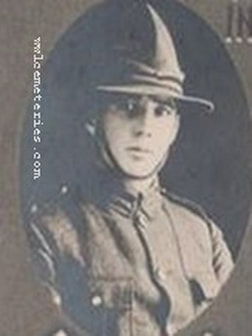
32674 Corporal
Albert George Johnston
1st Bn. Otago Regiment, N.Z.E.F.
12th October 1917.
N.Z. Apse, Panel 3.
Son of Mr. and Mrs. G. P. Johnston, of Comley Bank, Gore, Southland, Invercargill.
Albert George Johnston
1st Bn. Otago Regiment, N.Z.E.F.
12th October 1917.
N.Z. Apse, Panel 3.
Son of Mr. and Mrs. G. P. Johnston, of Comley Bank, Gore, Southland, Invercargill.
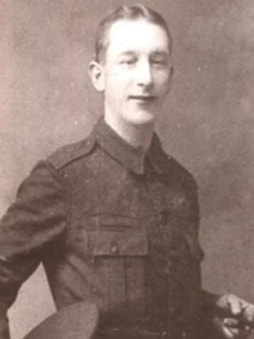
240738 Private
Thomas Jolly
4th Bn. The King's (Liverpool Regiment)
25th September 1917, aged 36.
Panel 31 to 34 and 162 and 162A and 163A.
Thomas was born on the 14th March 1881.
Wife of late Harriet Beatrice
Father of Thomas Johnson, Edward James, Ellen and Lillian Jolly of Monastery Road, Liverpool.
Son of William Jolly and Elizabeth Calderbank of Chorley.
Remembered by his Grandson Ian Jolly.
Thomas Jolly
4th Bn. The King's (Liverpool Regiment)
25th September 1917, aged 36.
Panel 31 to 34 and 162 and 162A and 163A.
Thomas was born on the 14th March 1881.
Wife of late Harriet Beatrice
Father of Thomas Johnson, Edward James, Ellen and Lillian Jolly of Monastery Road, Liverpool.
Son of William Jolly and Elizabeth Calderbank of Chorley.
Remembered by his Grandson Ian Jolly.
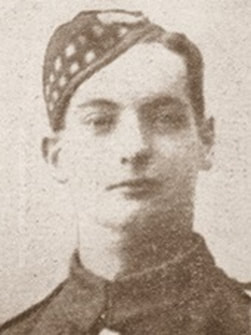
201414 Lance Corporal
Herbert M. Jordan
"B" Coy. 1st/5th Bn. The King's (Liverpool Regiment)
20th September 1917, aged 20.
Panel 31 to 34 and 162 and 162A and 163A.
Son of Mrs. and the late Mr. H. C. Jordan, of 13, Pendennis St., Anfield, Liverpool.
Herbert M. Jordan
"B" Coy. 1st/5th Bn. The King's (Liverpool Regiment)
20th September 1917, aged 20.
Panel 31 to 34 and 162 and 162A and 163A.
Son of Mrs. and the late Mr. H. C. Jordan, of 13, Pendennis St., Anfield, Liverpool.




